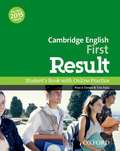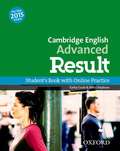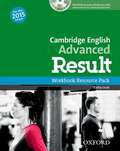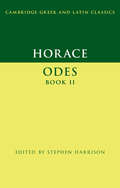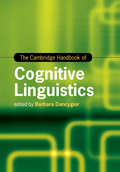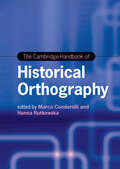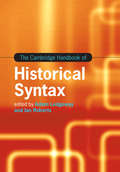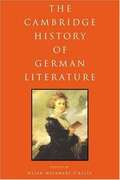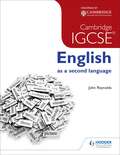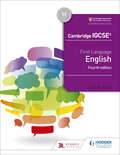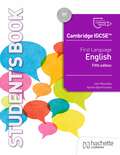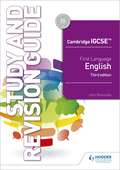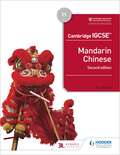- Table View
- List View
Cambridge Companions to…: The Cambridge Companion to the Beats
by Steven BellettoThe Cambridge Companion to the Beats offers an in-depth overview of one of the most innovative and popular literary periods in America, the Beat era. The Beats were a literary and cultural phenomenon originating in New York City in the 1940s that reached worldwide significance. Although its most well-known figures are Jack Kerouac, Allen Ginsberg, and William S. Burroughs, the Beat movement radiates out to encompass a rich diversity of figures and texts that merit further study. Consummate innovators, the Beats had a profound effect not only on the direction of American literature, but also on models of socio-political critique that would become more widespread in the 1960s and beyond. Bringing together the most influential Beat scholars writing today, this Companion provides a comprehensive exploration of the Beat movement, asking critical questions about its associated figures and arguing for their importance to postwar American letters.
Cambridge English First Result Student's Book with Online Practice
by Tim Falla Paul A DaviesPrepare your students for the new 2015 Cambridge English: First exam.Cambridge: English First Result is fully updated to prepare students for success in the new 2015 exam. The contemporary topics, lively texts and vibrant design keep students motivated and the online practice and online practice test provide plenty of opportunities for further learning outside class.The Teacher's Book includes unit tests, progress tests and a Speaking DVD showing students doing Speaking tests in exam-like conditions, which teachers can play to reassure their class about what to expect on exam day.
Cambridge English: Advanced Result
by Kathy Gude Mary StephensCambridge English: Advanced Result is fully updated to prepare students for success in the new 2015 exam. The contemporary topics, lively texts and vibrant design keep students motivated and the online practice and online practice test provide plenty of opportunities for further learning outside class. The Teacher's Book includes unit tests, progress tests and a Speaking DVD showing students doing Speaking tests in exam-like conditions, which teachers can play to reassure their class about what to expect on exam day.
Cambridge English: Advanced Result Workbook Resource Pack
by Kathy Gude Mary StephensCAE Result is a complete preparation course for the Cambridge English: Advanced (CAE) exam. It uses thought-provoking topics and vibrant images to keep your students motivated.
Cambridge Greek and Latin Classics: Horace (Cambridge Greek and Latin Classics)
by Stephen HarrisonHorace's Odes remain among the most widely read works of classical literature. This volume constitutes the first substantial commentary for a generation on this book, and presents Horace's poems for a new cohort of modern students and scholars. The introduction focusses on the particular features of this poetic book and its place in Horace's poetic career and in the literary environment of its particular time in the 20s BCE. The text and commentary both look back to the long and distinguished tradition of Horatian scholarship and incorporate the many advances of recent research and thinking about Latin literature. The volume proposes some new solutions to established problems of text and interpretation, and in general improves modern understanding of a widely read ancient text which has a firm place in college and university courses as well as in classical research.
Cambridge Handbooks in Language and Linguistics: The Cambridge Handbook of Areal Linguistics
by Raymond HickeyProviding a contemporary and comprehensive look at the topical area of areal linguistics, this book looks systematically at different regions of the world whilst presenting a focussed and informed overview of the theory behind research into areal linguistics and language contact. The topicality of areal linguistics is thoroughly documented by a wealth of case studies from all major regions of the world and, with chapters from scholars with a broad spectrum of language expertise, it offers insights into the mechanisms of external language change. With no book currently like this on the market, The Cambridge Handbook of Areal Linguistics will be welcomed by students and scholars working on the history of language families, documentation and classification, and will help readers to understand the key area of areal linguistics within a broader linguistic context.
Cambridge Handbooks in Language and Linguistics: The Cambridge Handbook of Bilingual Processing
by John W. SchwieterHow does a human acquire, comprehend, produce and control multiple languages with just the power of one mind? What are the cognitive consequences of being a bilingual? These are just a few of the intriguing questions at the core of studying bilingualism from psycholinguistic and neurocognitive perspectives. Bringing together some of the world's leading experts in bilingualism, cognitive psychology and language acquisition, The Cambridge Handbook of Bilingual Processing explores these questions by presenting a clear overview of current theories and findings in bilingual processing. This comprehensive handbook is organized around overarching thematic areas including theories and methodologies, acquisition and development, comprehension and representation, production, control, and the cognitive consequences of bilingualism. The handbook serves as an informative overview for researchers interested in cognitive bilingualism and the logic of theoretical and experimental approaches to language science. It also functions as an instrumental source of readings for anyone interested in bilingual processing.
Cambridge Handbooks in Language and Linguistics: The Cambridge Handbook of Child Language
by Bavin, Edith L. and Naigles, Letitia R. Edith L. Bavin Letitia R. NaiglesThe most authoritative resource for students and researchers, The Cambridge Handbook of Child Language has been thoroughly updated and extended. Enhancements include new chapters on the acquisition of words, processing deficits in children with specific language impairments, and language in children with Williams syndrome, new authors for the bilingualism and autism chapters, a refocused discourse chapter on written narratives, and a new section on reading and reading disorders, cementing the handbook's position as the best study of the subject available. In a wide-ranging survey, language development is traced from prelinguistic infancy to adolescence in typical and atypical contexts; the material is intuitively grouped into six thematic sections, enabling readers to easily find specific in-depth information. With topics as varied as statistical learning, bilingualism, and the neurobiology of reading disorders, this multidisciplinary Handbook is an essential reference for students and researchers in linguistics, psychology, cognitive science, speech pathology, education and anthropology.
Cambridge Handbooks in Language and Linguistics: The Cambridge Handbook of Cognitive Linguistics (Cambridge Handbooks in Language and Linguistics)
by Barbara DancygierThe best survey of cognitive linguistics available, this Handbook provides a thorough explanation of its rich methodology, key results, and interdisciplinary context. With in-depth coverage of the research questions, basic concepts, and various theoretical approaches, the Handbook addresses newly emerging subfields and shows their contribution to the discipline. The Handbook introduces fields of study that have become central to cognitive linguistics, such as conceptual mappings and construction grammar. It explains all the main areas of linguistic analysis traditionally expected in a full linguistics framework, and includes fields of study such as language acquisition, sociolinguistics, diachronic studies, and corpus linguistics. Setting linguistic facts within the context of many other disciplines, the Handbook will be welcomed by researchers and students in a broad range of disciplines, including linguistics, cognitive science, neuroscience, gesture studies, computational linguistics, and multimodal studies.
Cambridge Handbooks in Language and Linguistics: The Cambridge Handbook of English Historical Linguistics
by Merja Kytö Päivi Pahta Kytö Merja Pahta PäiviEnglish historical linguistics is a subfield of linguistics which has developed theories and methods for exploring the history of the English language. This Handbook provides an account of state-of-the-art research on this history. It offers an in-depth survey of materials, methods, and language-theoretical models used to study the long diachrony of English. The frameworks covered include corpus linguistics, historical sociolinguistics, historical pragmatics and manuscript studies, among others. The chapters, by leading experts, examine the interplay of language theory and empirical data throughout, critically assessing the work in the field. Of particular importance are the diverse data sources which have become increasingly available in electronic form, allowing the discipline to develop in new directions. The Handbook offers access to the rich and many-faceted spectrum of work in English historical linguistics, past and present, and will be useful for researchers and students interested in hands-on research on the history of English.
Cambridge Handbooks in Language and Linguistics: The Cambridge Handbook of Historical Orthography (Cambridge Handbooks In Language And Linguistics Ser.)
by Marco Condorelli Hanna RutkowskaCambridge Handbooks in Language and Linguistics: The Cambridge Handbook of Historical Syntax
by Ian Roberts Adam LedgewayChange is an inherent feature of all aspects of language, and syntax is no exception. While the synchronic study of syntax allows us to make discoveries about the nature of syntactic structure, the study of historical syntax offers even greater possibilities. Over recent decades, the study of historical syntax has proven to be a powerful scientific tool of enquiry with which to challenge and reassess hypotheses and ideas about the nature of syntactic structure which go beyond the observed limits of the study of the synchronic syntax of individual languages or language families. In this timely Handbook, the editors bring together the best of recent international scholarship on historical syntax. Each chapter is focused on a theme rather than an individual language, allowing readers to discover how systematic descriptions of historical data can profitably inform and challenge highly diverse sets of theoretical assumptions.
Cambridge Handbooks in Language and Linguistics: The Cambridge Handbook of Learner Corpus Research
by Sylviane GrangerThe origins of learner corpus research go back to the late 1980s when large electronic collections of written or spoken data started to be collected from foreign/second language learners, with a view to advancing our understanding of the mechanisms of second language acquisition and developing tailor-made pedagogical tools. Engaging with the interdisciplinary nature of this fast-growing field, The Cambridge Handbook of Learner Corpus Research explores the diverse and extensive applications of learner corpora, with 27 chapters written by internationally renowned experts. This comprehensive work is a vital resource for students, teachers and researchers, offering fresh perspectives and a unique overview of the field. With representative studies in each chapter which provide an essential guide on how to conduct learner corpus research in a wide range of areas, this work is a cutting-edge account of learner corpus collection, annotation, methodology, theory, analysis and applications.
Cambridge Handbooks in Language and Linguistics: The Cambridge Handbook of Linguistic Multi-competence
by Vivian Cook Li Wei Cook, Vivian and Wei, LiHow are two or more languages learned and contained in the same mind or the same community? This handbook presents an up-to-date view of the concept of multi-competence, exploring the research questions it has generated and the methods that have been used to investigate it. The book brings together psychologists, sociolinguists, Second Language Acquisition (SLA) researchers, and language teachers from across the world to look at how multi-competence relates to their own areas of study. This comprehensive, state-of-the-art exploration of multi-competence research and ideas offers a powerful critique of the values and methods of classical SLA research, and an exciting preview of the future implications of multi-competence for research and thinking about language. It is an essential reference for all those concerned with language learning, language use and language teaching.
Cambridge Handbooks in Language and Linguistics: The Cambridge Handbook of Morphology
by Andrew Hippisley Greg StumpThe Cambridge Handbook of Morphology describes the diversity of morphological phenomena in the world's languages, surveying the methodologies by which these phenomena are investigated and the theoretical interpretations that have been proposed to explain them. The Handbook provides morphologists with a comprehensive account of the interlocking issues and hypotheses that drive research in morphology; for linguists generally, it presents current thought on the interface of morphology with other grammatical components and on the significance of morphology for understanding language change and the psychology of language; for students of linguistics, it is a guide to the present-day landscape of morphological science and to the advances that have brought it to its current state; and for readers in other fields (psychology, philosophy, computer science, and others), it reveals just how much we know about systematic relations of form to content in a language's words - and how much we have yet to learn.
Cambridge History German Literature
by Watanabe-O'KellyIt is a history for our times: well-known authors and movements are set in a wider literary, cultural and political context, standard judgements are reexamined where appropriate, and a new prominence is given to writing by women. The book is designed for the general reader as well as the advanced student; titles and quotations are translated, and there is an extensive bibliography.
Cambridge IGCSE English as a second language
by John ReynoldsEndorsed by Cambridge International ExaminationsAn easy and cost-effective way to teach both the speaking and listening components.This title has been written for the latest Cambridge IGCSE English as a Second Language (0510 and 0511) syllabuses.- Prepares students for their exams with a focus on assessed language features, such as inference, opinion and attitude- Develops language abilities at an appropriate pace.
Cambridge IGCSE English as a second language + CD
by John ReynoldsEndorsed by Cambridge International Examinations An easy and cost-effective way to teach both the speaking and listening components with one set of books covering two years and free digital material. This title has been written for the latest Cambridge IGCSE English as a Second Language (0510 and 0511) syllabuses. - Prepares students for their exams with a focus on assessed language features, such as inference, opinion and attitude - Develops language abilities at an appropriate pace with extra interactive tests on a free CD-ROM
Cambridge IGCSE First Language English 4th edition
by John ReynoldsExam board: Cambridge Assessment International EducationLevel: IGCSESubject: EnglishFirst teaching: September 2018First exams: Summer 2020This title is endorsed by Cambridge Assessment International Education to support the full syllabus for examination from 2020.Inspire students with a new theme-based approach while supporting them with practical advice and accessible explanations; ensure full coverage of the latest Cambridge IGCSE First Language English syllabus (0500/0990) with a fully updated Student's Book, written by an experienced author and examiner. - Motivate students with engaging themes such as travel and exploration and people and community. - Develop reading comprehension, analysis and evaluation with a variety of text types and genres, plus annotations to aid understanding. - Improve writing skills with model responses and teacher commentary, and establish a strong background in spelling, punctuation and grammar. - Expand communication skills with advice on holding presentations and responding to questions confidently.- Consolidate learning with activities and study tips, as well as extra questions, practice tests and answers to selected questions online. Available in this series:Student Textbook Fourth edition (ISBN 9781510421318)Student eTextbook (ISBN 9781510420281) Whiteboard eTextbook (ISBN 9781510420298) Workbook (ISBN 9781510421325)Online Teacher's Guide (ISBN 9781510424159)Study and Revision Guide (ISBN 9781510421349)
Cambridge IGCSE First Language English 4th edition
by John ReynoldsExam board: Cambridge Assessment International EducationLevel: IGCSESubject: EnglishFirst teaching: September 2018First exams: Summer 2020This title is endorsed by Cambridge Assessment International Education to support the full syllabus for examination from 2020.Inspire students with a new theme-based approach while supporting them with practical advice and accessible explanations; ensure full coverage of the latest Cambridge IGCSE First Language English syllabus (0500/0990) with a fully updated Student's Book, written by an experienced author and examiner. - Motivate students with engaging themes such as travel and exploration and people and community. - Develop reading comprehension, analysis and evaluation with a variety of text types and genres, plus annotations to aid understanding. - Improve writing skills with model responses and teacher commentary, and establish a strong background in spelling, punctuation and grammar. - Expand communication skills with advice on holding presentations and responding to questions confidently.- Consolidate learning with activities and study tips, as well as extra questions, practice tests and answers to selected questions online. Available in this series:Student Textbook Fourth edition (ISBN 9781510421318)Workbook (ISBN 9781510421325)Study and Revision Guide (ISBN 9781510421349)
Cambridge IGCSE First Language English Fifth Edition
by John Reynolds Ayoola OgunmuyiwaThis title is endorsed for the Cambridge Pathway to support the syllabuses for examination from 2027. Written by experienced authors and teachers, our Student's Book provides accessible and engaging support for the latest Cambridge™ IGCSE and IGCSE (9-1) First Language English syllabuses (0500/0990). - Prepare thoroughly for all course components with extensive practice exercises designed for learners at all levels, ensuring comprehensive learning.- Engage with practical themes, such as travel, exploration, people and community.- Develop reading comprehension, analysis and evaluation with a variety of text types and genres, plus annotations to aid understanding. - Improve writing skills with sample answers and teacher commentary, and establish a strong background in spelling, punctuation and grammar.- Expand communication skills with advice on holding presentations and responding to questions confidently. - Consolidate learning with the 'Remember' feature, key terms and definitions, extra questions, end-of-chapter checklists and practice tests. - Deepen understanding by progressing from main ideas to complex questions. Answers to all the practice questions and activities are FREE to download from: www.hachettelearning.com/answers-and-extras
Cambridge IGCSE First Language English Fifth Edition
by John Reynolds Ayoola OgunmuyiwaThis title is endorsed for the Cambridge Pathway to support the syllabuses for examination from 2027. Written by experienced authors and teachers, our Student's Book provides accessible and engaging support for the latest Cambridge™ IGCSE and IGCSE (9-1) First Language English syllabuses (0500/0990). - Prepare thoroughly for all course components with extensive practice exercises designed for learners at all levels, ensuring comprehensive learning.- Engage with practical themes, such as travel, exploration, people and community.- Develop reading comprehension, analysis and evaluation with a variety of text types and genres, plus annotations to aid understanding. - Improve writing skills with sample answers and teacher commentary, and establish a strong background in spelling, punctuation and grammar.- Expand communication skills with advice on holding presentations and responding to questions confidently. - Consolidate learning with the 'Remember' feature, key terms and definitions, extra questions, end-of-chapter checklists and practice tests. - Deepen understanding by progressing from main ideas to complex questions. Answers to all the practice questions and activities are FREE to download from: www.hachettelearning.com/answers-and-extras
Cambridge IGCSE First Language English Study and Revision Guide 3rd edition
by John ReynoldsSend students into their exam with the confidence to achieve their maximum potential using step-by-step guidance that helps to practise skills learned and improve exam technique.- Avoid common errors with example student answers and structured feedback on how to gain full marks - Build students' skills constructing and writing answers with a range of practice and exam-style questions- Easily identify areas for improvement with the answers in the back of the book - Help students target their revision and focus on important concepts and skills with key objectives at the beginning of every chapter- Ensure that students maximise their time in the exam by including examiner's tips and suggestions on how to approach questionsThis Study and Revision Guide has been updated for the latest syllabus for examination from 2020. This title has not been through the Cambridge Assessment International Education endorsement process.Available in this series:Student Textbook Fourth edition (ISBN 9781510421318)Student eTextbook (ISBN 9781510420281) Whiteboard eTextbook (ISBN 9781510420298) Workbook (ISBN 9781510421325)Online Teacher's Guide (ISBN 9781510424159)Study and Revision Guide (ISBN 9781510421349)
Cambridge IGCSE First Language English Study and Revision Guide 3rd edition
by John ReynoldsSend students into their exam with the confidence to achieve their maximum potential using step-by-step guidance that helps to practise skills learned and improve exam technique.- Avoid common errors with example student answers and structured feedback on how to gain full marks - Build students' skills constructing and writing answers with a range of practice and exam-style questions- Easily identify areas for improvement with the answers in the back of the book - Help students target their revision and focus on important concepts and skills with key objectives at the beginning of every chapter- Ensure that students maximise their time in the exam by including examiner's tips and suggestions on how to approach questionsThis Study and Revision Guide has been updated for the latest syllabus for examination from 2020. This title has not been through the Cambridge Assessment International Education endorsement process.Available in this series:Student Textbook Fourth edition (ISBN 9781510421318)Workbook (ISBN 9781510421325)Study and Revision Guide (ISBN 9781510421349)
Cambridge IGCSE Mandarin Chinese Student's Book 2nd edition
by Yan BurchThis title is endorsed by Cambridge Assessment International Education to support the full syllabus for examination from 2022.Provide guidance, exercises and examples in all four key skills, with speaking, listening, reading and writing integrated into every chapter; updated to support the revised Cambridge IGCSETM Mandarin Chinese (0547) syllabus.- Improve comprehension and delivery of language with all four key skills comprehensively covered throughout with icons to identify when each skill should be used and practised.- Enhance speaking skills with Pinyin (phonetics) that aid correct pronunciation.- Aid understanding with vocabulary and grammar boxes that offer clear explanations and examplesentences.- Build skills with exercises arranged progressively from simple, to complex and comprehensive.- Provide additional practice with the accompanying Workbook, perfect as a course companion or homework book for use throughout the course.- Engage, challenge and motivate you student with interactive resources from our partner Languagenut*, for more information visit www.hoddereducation.co.uk/languagenut*The Languagenut resources are not part of the Cambridge International endorsement process.Also available in the series:Student eTextbook 9781510485129 Whiteboard eTextbook 9781510485112 Workbook 9781510485402

